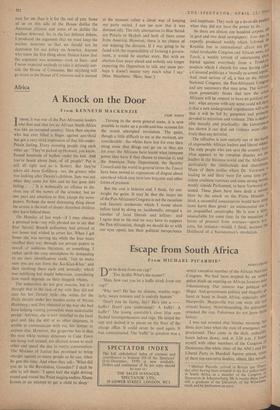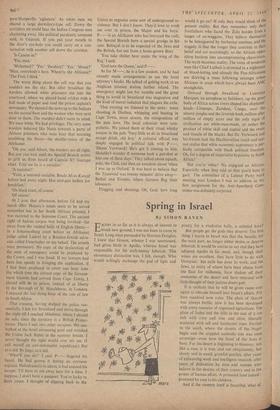Escape from South Africa
From MICHAEL.PICARDIE*
ID he drink from our cup?'
'Yes, he did. What's the matter?'
`Man, how can you let a kaffir drink from our cup?'
'Why not? He has no disease, washes regu- larly, wears trousers and is entirely human.'
'Don't you be funny, hey! He's just a kaffir! Don't you understand? A kaffir! A kaffir!' The young constable's clear blue eyes flashed incomprehension and rage. He seized the cup and dashed it to pieces on the floor of the charge office. It could never be used again. It was contaminated. The `kaffir' in question was a senior executive member of the African National, Congress. We had been stopped by an armed police block on entering an African location neajl. Johannesburg. Our mission was political an illegal. Anti-government politics and illegality g° hand in hand in South Africa, especially after Sharpeville. Sharpeville was one week old and already history. Notwithstanding, the policeman smashed the cup. Policemen do not learn from history. I was not arrested that Sunday morning. but three days later when the state of emergency vv3s proclaimed. They came in the dark, unhealthy hours before dawn, and at 3.30 a.m. I Wild, myself with other members of the Congress 't Democrats (the white sister of the ANC) and the Liberal Party in Marshall Square prison, s onlf of them top executive leaders, others, like mYselh * Michael Picardie arrived in Britain last Thurr day after having been arrested in the first police raw! in South Africa as a member of the Congress 01 Democrats in Johannesburg. He is twenty-three ye3r3 old; a graduate of the University of the Witwaters- rand; and by profession an actor. post-Sharpeville 'agitators.' As white men we shared a large dormitory-type cell. Down the corridors we could hear the Indian Congress men chattering away, like political parakeets, someone said, in Gujerati. If you put your mouth to the door's eye-hole you could carry on a con- versation with another cell down the corridor.
'Is Cassim in?'
`Yes, man.'
`Mohamed?' Yes."Ibrahim?"Yes."Mosie?' `Man, everybody's here. Where're the Africans?' 'The Fort, I think.'
The worst thing about the cell was that you couldn't see the sky. But after breakfast the warders allowed white prisoners out into the courtyard, where we played hand cricket with a ball made of paper and read the prison captain's newspaper. We shouted the news up to the Indians on the second floor and the women who were next door to them. The warders didn't seem to mind. We were white. We had privileges. The very same warders behaved like Nazis towards a party of African prisoners who were busy that morning scrubbing the floors—the double-vision of the Afrikaner.
yes,' said Albert, 'the warders are all right. But just you wait until the Special Branch arrive to grill us. Ever heard of Captain X? Gestapo chief. Told me he is a socialist.'
'A socialist?'
`Yeah, a national socialist. Reads Mein Kampf before bed every night. Has sten-gun bullets for breakfast.'
'On black toast, of course.'
'Of course.'
At 2 p.m. that afternoon, before I'd had my lunch (Her Majesty's meals seem to be served somewhat late in her South African prisons), I was escorted to the Supreme Court. The ancient right of habeas corpus was being invoked—far away from the vaulted halls of English liberty— in a Johannesburg court before an Afrikaner judge called Ludorf by a Russian-Jewish advo- cate called Unterhalter on my behalf. The arrests were premature. No copy of the declaration of the state of, emergency could be produced by the Crown, and I was freed. If my lawyers had been less speedy in bringing the application, if I had been produced in court one hour later (by which time the correct copy of the Govern- ment Gazette had arrived from Cape Town), I should still be in prison, instead of at liberty in the Borough of St. Marylebone, in London. I enjoyed the last dying hour of the rule of law in South Africa.
That evening, having dodged the police suc- cessfully, I left for Swaziland and drove. through the night till I reached M babane, where I should be safe, since the territory is a British Protec- torate. There I met two other escapees. We sun- bathed at the hotel swimming pool and watched the Union Jack flutter in the summer breeze. I never thought the sight would ever stir me. (I call myself an anti-nationalist republican.) But so it did. By jingo, so it did.
'What'll you do?' I said. P fingered his beard. He had grown it during an overseas sojourn. Melodramatic to admit, it had assisted his escape. 'I'll have to rot away here for a time, I suppose. I don't have a passport. You're lucky to have yours. I thought of slipping back to the Union to organise some sort of underground re- sistance. But I don't know. They'd love to work me over in prison, the Major and his boys.' P— is an Afrikaner who has betrayed the yolk; the Special Branch have a special grudge in his case. Betrayal is to be expected of the Jews and the British, but not from a home-grown Boer.
'You take shelter here under the wing of the Raj,' I said.
'God save the Queen,' said P—.
As for M—, he is a law student, and he had already made arrangements to use the local attorney's books. He talked of getting work at an Anglican mission station farther inland. The emergency might last, for months and the great thing to avoid in Swaziland was stagnation and the kind of moral isolation that plagues the exile.
That evening we listened to the news: more shooting in Durban, whipping and beating in Cape Town, more arrests, the reimposition of the pass laws. The local colonials were sym- pathetic. We joined them at their ritual whisky session in the pub. 'Very little to do in Swaziland except drink, old boy.' A colonial official was deeply engaged in political talk with P—. `Damn Verwoerd! He's got it coming to him. Shouldn't wonder if someone took a pot-shot at him one of these days.' They talked about squash, polo, the Club, and then an anecdote about 'when I was up at Oxford.' It was hard to believe that the Transvaal was twenty minutes' drive away- Bethal and Ermelo, where farmers flog their labourers.
Flogging and shooting. Oh, God, how long would it go on? If only they would think of the present reality. But they remember only their forefathers who faced the Zulu hordes from a laager of ox-waggons. They believe themselves to be beleaguered by barbarian enemies, and the tragedy is that the longer they continue in their belief and act accordingly, so the African oPP°- sition hardens into uncompromising chauvinism. The myth becomes reality. The voice of moderate men like Chief Luthuli is drowned in a nightmare of blood-letting and already the Pan-Africanists are drawing a mass following amongst urban Africans in areas which have always been ANC strongholds. Onward through Swaziland to Lourenco Marques, an aeroplane.to Salisbury, up the great body of Africa across rivers shaped like elephants' heads—Limpopo, Zambesi, Congo, over the steamy jungles and the feverish bush, million after million of empty acres and the only signs of civilisation are white-man-made, or rather the product of white skill and capital and the sweat and muscle of the blacks. But Dr. Verwoerd and his friends lack the Machiavellian touch and can- not realise that white economic supremacy is per- fectly compatible with black political freedom. Oh, for a degree of imperialist hypocrisy in South Africa! 'But you're white! We expefted an African. Especially when they told us \ that you'd been to gaol.' The committee of a Labour Party ward meeting near London I was to address as my first assignment for the Anti-Apartheid Com- mittee was definitely surprised.











































 Previous page
Previous page